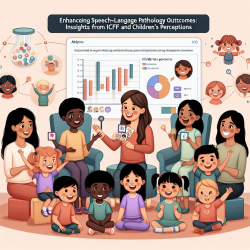Introduction
As practitioners dedicated to improving outcomes for children, understanding the early signs of mental health issues, such as psychosis, is crucial. The research article "Genealogy of Instruments for Prodrome Evaluation of Psychosis" provides valuable insights into the development and effectiveness of various instruments designed to assess the risk of conversion to psychosis. By leveraging these tools, practitioners can make data-driven decisions that enhance early intervention strategies, ultimately benefiting the children they serve.
Understanding the Instruments
The research identifies 22 instruments developed over the past decades to evaluate the risk of conversion to psychosis. These instruments are classified into two major approaches:
- Attenuated Psychotic Symptoms: These tools aim to identify individuals at risk of imminent conversion to psychosis by focusing on symptoms that are not yet fully psychotic.
- Basic Symptoms: These instruments assess the first phase of subjective disturbances that occur at the onset of psychosis, such as changes in thoughts, emotions, and perceptions.
Some instruments combine elements from both approaches, providing a comprehensive assessment of risk factors.
Key Findings and Implications
The research highlights several key findings that practitioners should consider:
- Improved Predictive Value: These instruments outperform conventional variables in predicting conversion to psychosis, allowing for more targeted interventions.
- Multicenter Studies: Collaborative studies have improved the standardization of these instruments, facilitating more accurate comparisons and evaluations.
- Screening Tools: The development of shorter, self-administered questionnaires enables non-specialists to identify individuals who may require further evaluation, enhancing early detection efforts.
Implementing Research Outcomes
Practitioners can leverage the findings of this research in several ways:
- Adopt Data-Driven Approaches: Utilize these instruments to make informed decisions about early intervention strategies, ensuring that resources are allocated effectively.
- Encourage Further Research: Stay informed about ongoing developments in the field and contribute to research efforts that aim to refine and improve these assessment tools.
- Collaborate with Specialists: Work closely with mental health professionals to ensure that children at risk of psychosis receive the appropriate care and support.
Conclusion
The instruments for prodrome evaluation of psychosis represent a significant advancement in early intervention strategies. By understanding and utilizing these tools, practitioners can enhance their ability to identify and support children at risk of developing psychosis, ultimately leading to better outcomes. For those interested in delving deeper into the research, the original paper provides a comprehensive overview of the genealogy and effectiveness of these instruments.
To read the original research paper, please follow this link: Genealogy of Instruments for Prodrome Evaluation of Psychosis.










